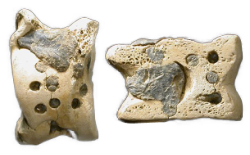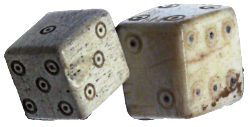John D. Norton
History of Chance


John D. Norton
|
||
| home >> research >> History of Chance | ||
 |
In lotteries and bookmaking, analyzing chance systems globally provides advantages over local, probabilistic analysis. Global thinking also explains how ancient thinkers who had no theory of probability may have found physical randomizers like dice fit for their purposes in gambling, lot drawing and divination. | "Lotteries, Bookmaking and Ancient Randomizers: Local and Global Analyses of Chance," Studies in History and Philosophy of Science, 95 (2022), pp. 108–117. Download. |
 |
A precursors to probability theory was a seventeenth century theory of chance for physical randomizers. It used combinatorics to count chances and derived a serviceable rule for determining which are fair wagers. It lacked an epistemic notion of chance and a precise means to connect chance counts and frequencies; and could not compare chances across different games. | "Chance Combinatorics: The Theory that History Forgot," download draft. |